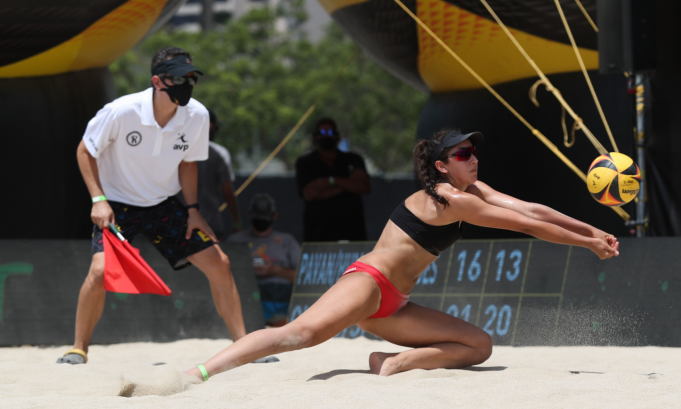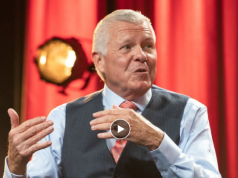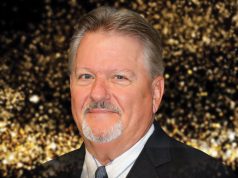Turn on NBC in the summer during a normal year and you are likely to see some of the top volleyball players in the country competing on the sand. In front of thousands of spectators and a DJ whipping the crowd into a frenzy, the Association of Volleyball Professionals (AVP) Tour annually makes stops in some of the best locations in the country — Huntington Beach, Calif., Hawaii, New York City and Chicago.
But in 2020, that type of schedule just wasn’t possible for the AVP Tour. However, instead of canceling the entire season, the AVP decided to hold tournaments on three straight weekends in mid-July through early August. The new series, called the Champions Cup Series, was exclusively in Long Beach, Calif., and followed strict COVID-19 protocols to ensure the safety of everyone involved.
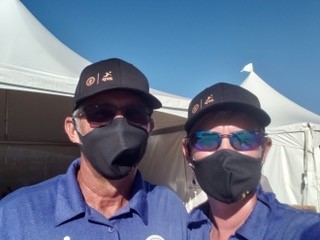
Two of those involved were officials Keith Murlless and Suzanne Lowry. The husband-and-wife team from Greenville, S.C., have been a part of the AVP for years and their credentials are unmatched. But they too were challenged by the new format and the new protocols.
Lowry, who is one of the two head referees for the AVP and is an international beach volleyball referee, was excited to get back to work but admitted there were some challenges.
“It’s been a pleasure and we are so excited to be back out,” she said. “But it’s been a challenge because we all had a five-month break with no whistling at all. To go from zero to 60 almost immediately was a challenge. Everyone was rusty. The players were rusty. The referees were rusty.”
One of the biggest challenges was the setup of the event. Normal AVP events have a qualifying event that features up to 100 teams in both men’s and women’s draws which feeds into a main draw that features up to 32 teams. Normally, officials have the opportunity to work a lot of matches over the course of three to four days and it takes a few matches before the elite teams face off against each other.
That was certainly not the case in 2020 as each of the three tournaments were an eight-team main draw with a 12-team qualification match. That meant each match featured elite players battling from the onset. “Only the top players in the country and all our best pros were playing in this,” Lowry said. “Matches we normally don’t see until late in the tournament were happening first thing in the morning. We jumped straight into the highest levels of competition right away.”
On top of having to officiate ultra-competitive matches from the get-go, officials had to navigate new protocols, including wearing face masks, using electronic whistles and social distancing throughout the tournaments. Some of those protocols took a little time to get used to.
“The masks are proving to be more challenging than the electronic whistles,” said Murlless, who was a FIVB international beach referee from 2004-18 and current AVP regular. “We are unable to convey facial expressions. We were reminded very quickly how we use that to promote goodwill and relationships with players. That was a huge handicap.”
Volleyball officials use a lot of non-verbal communication in order to relay messages to players. Due to the masks, a lot of those simple gestures were unable to be conveyed, which proved to be a tricky endeavor, according to Lowry. “There really is almost zero non-verbal communication anymore,” she said. “A well-timed smile can go a long way as well as a well-timed ‘mom-look.’ You can’t do that when your face is hidden.”
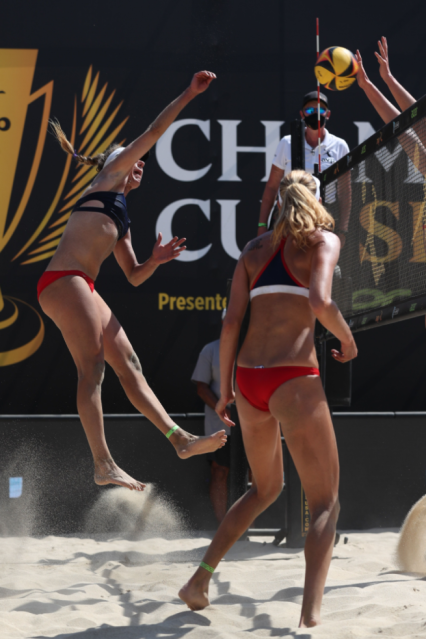
Another issue caused by the masks was that wearing them caused sunglasses to fog up, but sunglasses are a necessity when working beach volleyball. Finding techniques to solve that problem proved to be challenging. “I was holding my breath through the men’s matches early on when the fogging was bad,” Murlless said. “Fortunately, our rallies only last 10 seconds.”
The major issue with the electronic whistles dealt with ending rallies that ended on referee judgment. According to Lowry, players had no issues when the rally ended on its own accord, such as a ball out of bounds, a kill in-bounds or a ball hit into the net. However, when she had to end the rally due to referee intervention, things became more difficult. “If I had to call a double, interference or whatever other interrupting fault, for some reason I still wanted to blow air out of my mouth,” she said. “When using the electronic whistle, I don’t get the same whistle length consistently with that. It is more of a ‘bloop’ than a ‘tweet.’”
She also mentioned the fact that referees give each other help signals such as a thumbs up to let their partners know they are getting the information. With the electronic whistle, she had to make sure she didn’t accidentally hit the button and have an inadvertent whistle.
While this new season had its share of challenges, there was one thing that stood out as a positive for both officials with the new protocols — no fans. Typical beach volleyball crowds can be quite raucous and with a DJ who plays the part of hype-man, it can be quite noisy during a match. With no fans in the stands this season, that wasn’t an issue.
“For the players, especially some of the players who really feed off that energy, I felt a little sorry for them,” Murlless said. “For the referees, it made life more simple. It was simpler in terms of logistical issues. Usually to get from the referee area to an assigned court is a 10-minute elbow jostling. Now you can take a leisurely stroll.”
For Lowry, it was nice to be able to work without the constant barrage from the fans. “You miss the roar of the crowd, but sadly our society has evolved to where everybody feels like they are an expert in everything and they get to loudly berate the work officials do even when those people don’t have any idea what the rules or points of emphasis are,” she said. “I haven’t had a single person give me any heckling and it is a true delight.”
Despite the new challenges and the minor bumps in the sand, both Lowry and Murlless were complimentary of the way AVP handled everything and the level of expertise they showed enacting new protocols. “They were really trying to do an event and keep everyone safe,” Lowry said. “Doing three weekends in a row in the same city, they could set it up once and leave it in place for three events instead of moving the entire circus to other towns.”
Brad Tittrington is an associate editor for Referee and officiates high school and collegiate volleyball.
What's Your Call? Leave a Comment:
Note: This article is archival in nature. Rules, interpretations, mechanics, philosophies and other information may or may not be correct for the current year.
This article is the copyright of ©Referee Enterprises, Inc., and may not be republished in whole or in part online, in print or in any capacity without expressed written permission from Referee. The article is made available for educational use by individuals.

